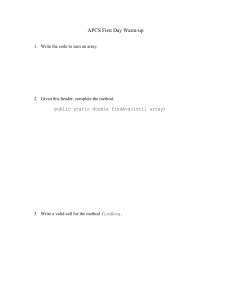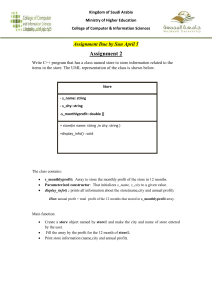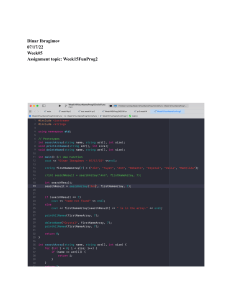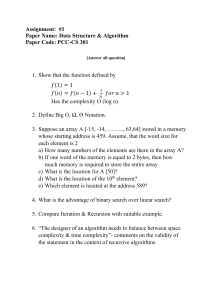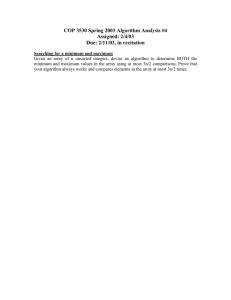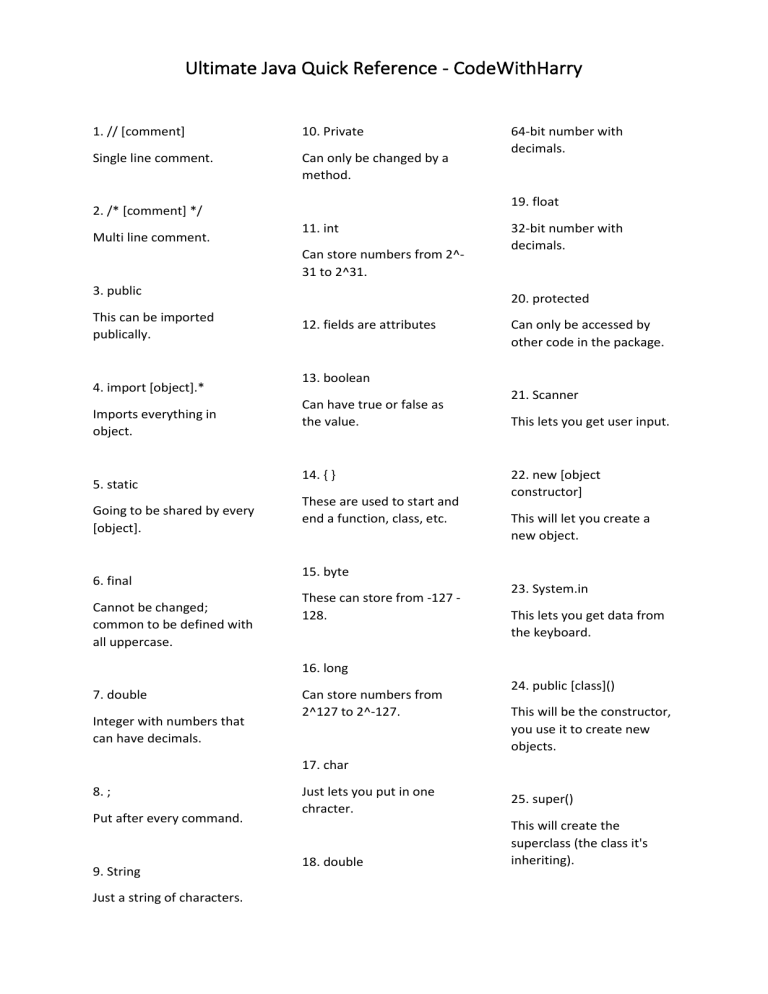
Ultimate Java Quick Reference - CodeWithHarry
1. // [comment]
10. Private
Single line comment.
Can only be changed by a
method.
19. float
2. /* [comment] */
Multi line comment.
11. int
Can store numbers from 2^31 to 2^31.
3. public
This can be imported
publically.
4. import [object].*
Imports everything in
object.
5. static
Going to be shared by every
[object].
6. final
Cannot be changed;
common to be defined with
all uppercase.
64-bit number with
decimals.
32-bit number with
decimals.
20. protected
12. fields are attributes
Can only be accessed by
other code in the package.
13. boolean
Can have true or false as
the value.
14. { }
These are used to start and
end a function, class, etc.
21. Scanner
This lets you get user input.
22. new [object
constructor]
This will let you create a
new object.
15. byte
These can store from -127 128.
23. System.in
This lets you get data from
the keyboard.
16. long
7. double
Integer with numbers that
can have decimals.
Can store numbers from
2^127 to 2^-127.
24. public [class]()
This will be the constructor,
you use it to create new
objects.
17. char
8. ;
Put after every command.
9. String
Just a string of characters.
Just lets you put in one
chracter.
18. double
25. super()
This will create the
superclass (the class it's
inheriting).
Ultimate Java Quick Reference - CodeWithHarry
26. extends [class]
Makes the object a subclass
of [object], [object] must be
a superclass.
35. public static void
main(String[] args)
This is your main function
and your project will start in
here.
28. --
29. += [amount]
Called a line break; will print
a new line.
38. \t
47.
[inputVarHere].hasNextLine
()
This will return if there is a
next line in the input.
48. this
39. if ([condition])
Multiply by [amount]
This means greater than or
equal to.
This will print a tab.
Decrement by [amount]
31. *= [amount]
46. >=
37. \n
Increment by [amount]
30. -= [amount]
45. >
36. System.out.print([text])
This prints stuff but there is
no line break. (/n)
Will decrement the amount.
This means less than.
This means greater than.
27. ++
Will increment the amount.
44. <
This will make it so if
[condition] is true then it'll
keep going.
Refer to the class that you
are in.
49. [caller].next[datatype]()
32. /= [amount]
40. &&
Divide by [amount]
This means and.
33.
System.out.println([text])
41. !
Will print something to the
output console.
This means not.
42. ||
34. +
Can be used for
concatenation. (ex. "6" +
[var_here])
This will get the [datatype]
that you somehow
inputted.
50. Create getters and
setters
This will create the get
methods and set methods
for every checked variable.
This means or.
43. ==
This means equal to.
51.
[caller].hasNext[datatype]()
Ultimate Java Quick Reference - CodeWithHarry
This will return if it has the
correct datatype within the
input.
This will parse [number]
into the [numbertype] with
[string].
52. overloading
59. ^
If you have different
parameters you can call
them whatever way you
want.
Return true if there is one
true and one false.
60. !=
53. parameters
These are the inputs of your
function.
54. ([datatype])[variable]
This will convert [variable]
into [datatype]. Also known
as casting.
55. Math.random()
Generate an extremely
percise string of numbers
between 0 and 1.
61. ([condition]) ? [amount]
: [var]
This will be like a shortcut
way to an if statement.
58.
[number].parse[numbertyp
e]([string])
This will just go back to the
enclosing loop before
reaching other code.
This will basically do
something while [condition]
is true.
69. void
62. switch([variable])
This will do stuff with
specific cases. (e.g.
switch(hi){ case 2: (do
stuff)})
This will do stuff if the case
is the case.
64. break
Will convert [x] into a string.
67. continue
68. while ([condition])
Just the basic data types
which are not objects.
57. [x].toString()
This will start at [number]
and then do [operation]
until [condition] is met.
Not equal too. (NEQ)
63. case [value]:
56. Primitives
66. for ([number];
[condition]; [operation])
Put that when you want to
leave the loop/switch;
should be at end of case.
65. default [value]:
This will do stuff if none of
the cases in the switch
statement was made.
This means no return type.
70. return
This will return something
when you call it to where it
was called from .
71. do { } while ([condition])
Guarantees it will execute
once even if [condition]
isn't met.
72. printf("%[type] stuff
here bah bla", [variable
here])
This will let you use
[variable here] with %s
being where.
Ultimate Java Quick Reference - CodeWithHarry
73. System.out.printf([text])
Another way to print? //
didn't quite get but ok then
74. [type] [returntype]
[name]([parameters]) {
This is a way to create a
method.
75. [type][[indexes]]
This will get how long
something is, text, amount
of indexes in array, etc.
80. Arrays.copy0f([array],
indexes);
This will copy the array and
how many indexes into
another array.
81. Arrays.toString([array])
This will create an array
with [indexes] amount of
indexes; default infinite.
Convert the whole array
into one huge string.
76. int[] something = new
int[20];
82.
Arrays.binarySearch([array],
[object])
This will just make an array
of ints with 20 ints in it.
77. for ([object]
[nameOfObject] :
[arrayOfObject]) {
This will iterate through all
of the arrayOfObject with
object in use incrementing
by 1 until done.
78. [object][[1]][[2]][[3]]
[name] = {[value] [value]
[value] \n [value] [value]
[value]}
[1] is how many down in
array, [2] how many accross
in array, [3] how many
groups
79. .length
This will search for [object]
in [array].
